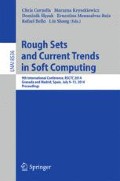Abstract
Groups of learners of similar features are often created in order to diversify the environment accordingly. However student preferences may differ depending on the context of the system usage. Each new student, who intends to join the community, should obtain context-aware recommendation of the group of colleagues matching his needs. In the paper, using fuzzy logic for modeling student groups is considered. We propose to build the possibility-based representation of each group. We assume that context can be modeled by a vector of weights. Then recommendations for new students are determined taking into account a degree of possibility of matching together with the respective context parameters. We examine the presented approach by taking into account learning style dimensions as attributes which characterize student preferences. The method is evaluated on the basis of experimental results obtained for data of different groups of real students.
Access this chapter
Tax calculation will be finalised at checkout
Purchases are for personal use only
Preview
Unable to display preview. Download preview PDF.
References
Zakrzewska, D.: Building Context-Aware Group Recommendations in E-learning Systems. In: Jędrzejowicz, P., Nguyen, N.T., Hoang, K. (eds.) ICCCI 2011, Part I. LNCS, vol. 6922, pp. 132–141. Springer, Heidelberg (2011)
Myszkorowski, K., Zakrzewska, D.: Using Fuzzy Logic for Recommending Groups in E-learning Systems. In: Bǎdicǎ, C., Nguyen, N.T., Brezovan, M. (eds.) ICCCI 2013. LNCS (LNAI), vol. 8083, pp. 671–680. Springer, Heidelberg (2013)
Dubois, D., Prade, H., Testemale, C.: Weighted fuzzy pattern matching. Fuzzy Set Syst. 28, 313–331 (1988)
Adomavicius, G., Tuzhilin, A.: Context-Aware Recommender Systems. In: Ricci, F., et al. (eds.) Recommender Systems Handbook, pp. 217–253. Springer (2011)
Zheng, Y., Burke, R., Mobasher, B.: Recommendation with Differential Context Weighting. In: Carberry, S., Weibelzahl, S., Micarelli, A., Semeraro, G. (eds.) UMAP 2013. LNCS, vol. 7899, pp. 152–164. Springer, Heidelberg (2013)
Das, M.M., Chithralekha, T., SivaSathya, S.: Static context model for context aware e-learning. Int. J. En. Sci. Tech. 2, 2337–2346 (2010)
Rosaci, D., Sarne, G.: Efficient personalization of e-learning activities using a multi-device decentralized recommender System. Comput. Intell. 26, 121–141 (2010)
Yang, F., Han, P., Shen, R.-M., Hu, Z.: A novel resource recommendation system based on connecting to similar e-learners. In: Lau, R., Li, Q., Cheung, R., Liu, W. (eds.) ICWL 2005. LNCS, vol. 3583, pp. 122–130. Springer, Heidelberg (2005)
Christodoulopoulos, C., Papanikolaou, K.: A group formation tool in an e-learning context. In: 19th IEEE ICTAI 2007, vol. 2, pp. 117–123 (2007)
Boratto, L., Carta, S.: State-of-the-Art in Group Recommendation and New Approaches for Automatic Identification of Groups. In: Soro, A., Vargiu, E., Armano, G., Paddeu, G. (eds.) Information Retrieval and Mining in Distributed Environments. SCI, vol. 324, pp. 1–20. Springer, Heidelberg (2010)
Masthoff, J.: Group Recommender Systems: Combining Individual Models. In: Ricci, F., et al. (eds.) Recommender Systems Handbook, pp. 677–702. Springer (2011)
Campos, L., Fernández-Luna, J., Huete, J., Rueda-Morales, M.: Managing uncertainty in group recommending processes. User Model. User-Adap. 19, 207–242 (2009)
Wang, J., Li, H., Zhao, H.: The contextual group recommendation. In: 5th Int. Conf. on Intelligent Networking and Collaborative Systems, pp. 127–131 (2013)
Vrettaros, J., Vouros, G.A., Drigas, A.S.: Development of an intelligent assessment system for solo taxonomies using fuzzy logic. In: Mellouli, K. (ed.) ECSQARU 2007. LNCS (LNAI), vol. 4724, pp. 901–911. Springer, Heidelberg (2007)
de Arriaga, F., El Alami, M.: Arriaga: Evaluation of Fuzzy Intelligent Learning Systems. In: Méndez-Vilas, A., et al. (eds.) Recent Research Developments in Learning Technologies. FORMATEX, Badajoz (2005)
Lau, R., Song, D., Li, Y., Cheung, T., Hao, J.: Towards A Fuzzy Domain Ontology Extraction. IEEE T. Knowl. Data En. 21, 800–813 (2009)
Faziolahtabar, H., Mahdavi, I.: User/tutor optimal learning path in e-learning using comprehensive neuro-fuzzy approach. Educ. Res. Rev. 4, 142–155 (2009)
Ferreira-Satler, M., Romero, F., Menéndez-Domínguez, V., Zapata, A., Prieto, M.: Fuzzy ontologies-based user profiles applied to enhance e-learning activities. Soft Comput. 16, 1129–1141 (2012)
Serrano-Guerrero, J., Romero, F., Olivas, J.: Hiperion: A fuzzy approach for recommending educational activities based on the acquisition of competences. Information Sciences 248, 114–129 (2013)
Zadeh, L.: Fuzzy sets as a basis for a theory of possibility. Fuzzy Set Syst. 1, 3–28 (1978)
Dubois, D., Prade, H.: The three semantics of fuzzy sets. Fuzzy Set Syst. 90, 141–150 (1997)
Felder, R., Silverman, L.: Learning and teaching styles in engineering education. Eng. Educ. 78, 674–681 (1988)
ILS Questionnaire, http://www.engr.ncsu.edu/learningstyles/ilsweb.html
Author information
Authors and Affiliations
Editor information
Editors and Affiliations
Rights and permissions
Copyright information
© 2014 Springer International Publishing Switzerland
About this paper
Cite this paper
Myszkorowski, K., Zakrzewska, D. (2014). Building Contextual Student Group Recommendations with Fuzzy Logic. In: Cornelis, C., Kryszkiewicz, M., Ślȩzak, D., Ruiz, E.M., Bello, R., Shang, L. (eds) Rough Sets and Current Trends in Computing. RSCTC 2014. Lecture Notes in Computer Science(), vol 8536. Springer, Cham. https://doi.org/10.1007/978-3-319-08644-6_37
Download citation
DOI: https://doi.org/10.1007/978-3-319-08644-6_37
Publisher Name: Springer, Cham
Print ISBN: 978-3-319-08643-9
Online ISBN: 978-3-319-08644-6
eBook Packages: Computer ScienceComputer Science (R0)

